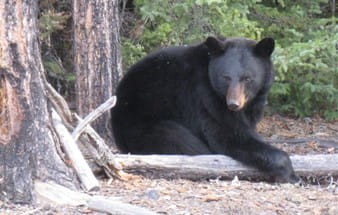Released on May 24, 2023
It's that time of year - remember to be bear aware. As warmer weather settles in, our furry friends will be leaving their dens in search of food.
Black bears are found throughout most of the province. They are commonly spotted in northern Saskatchewan forests, but their range extends southward into the aspen parkland and into other areas including the Touchwood Hills, the Qu'Appelle Valley and the South Saskatchewan River Valley.
"Remember, Saskatchewan is bear country," Environment Minister Dana Skoropad said. "Bears and other wildlife are a natural part of our landscape. Taking some simple, proactive steps can help protect us and the bears from potential conflicts."
Bears become a nuisance and a threat to public safety when they associate humans with their food source. Some items that can attract bears include pet food, household waste and overloaded compost bins. Removing these and other attractants will reduce the chance of an unwanted visitor to your yard.

To further protect the public, provincial regulations prohibit the feeding of bears, wolves, cougars and coyotes. This regulation does not apply to landfills or hunters and trappers operating under a licence.
Steps for bear-proofing your yard include:
- Store garbage in a secure building or buy a bear-resistant container. Only put your garbage bin out on the morning of collection.
- Wash all recycling items and regularly clean garbage or recycling bins.
- Ensure pet food is stored where it is not accessible to wildlife.
- Only use bird feeders in the winter while bears hibernate.
- Do not add fish, meat, fat, oils, unrinsed eggshells or any cooked food to compost bins.
- Properly clean and store barbecue grills after each use.
If a bear (or other wildlife) is posing an imminent risk to human safety, call 911. To report an encounter with aggressive wildlife, call the Turn in Poachers and Polluters (TIPP) line at 1-800-667-7561. To report concerns about nuisance wildlife, including bears, call the Ministry of Environment at 1-800-567-4224 or email centre.Inquiry@gov.sk.ca.
Additional information about bears and bear safety is available at www.saskatchewan.ca/wildlife-issues.
-30-
For more information, contact:
Val Nicholson
Environment
Prince Albert
Phone: 306-953-2459
Email: Val.Nicholson@gov.sk.ca

